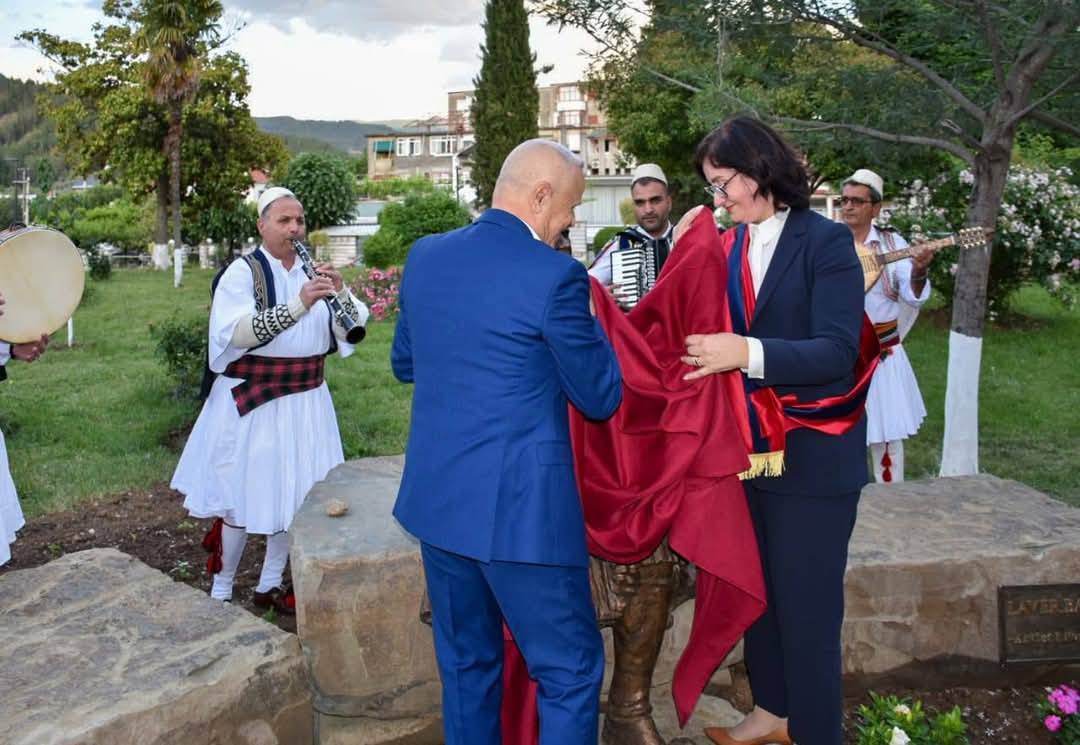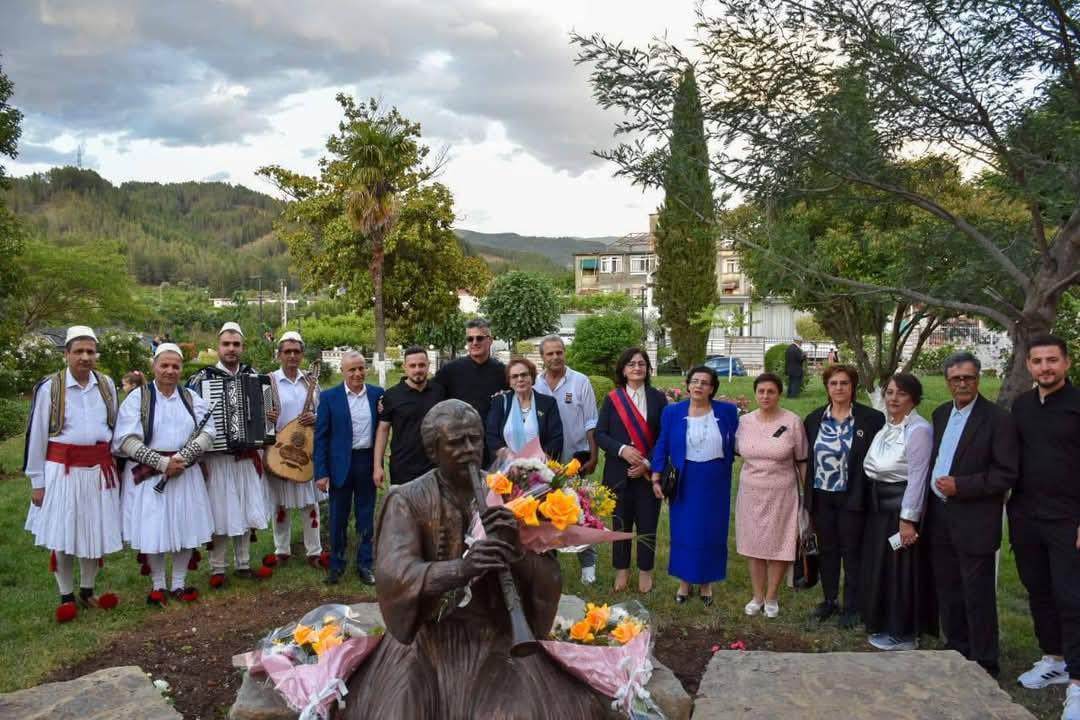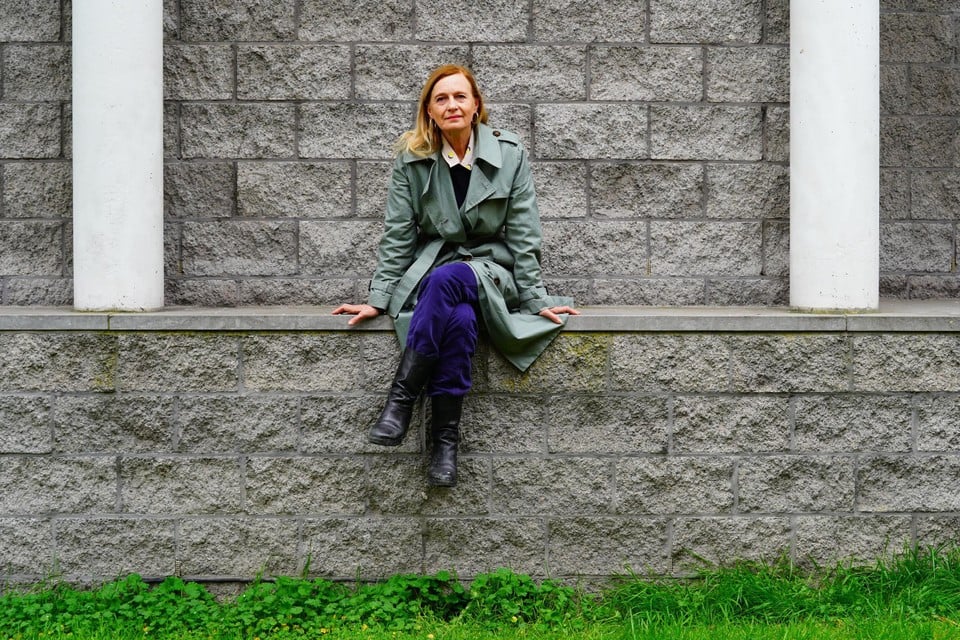Laver Shepherd, the clarinetist who turned the spirit into the language of the Albanian spirit, now living in the statue

By Albert Vataj
Although eleven years have passed since his separation from his life, Laver Bariu remains alive in the collective consciousness of our culture, immortalized not only through the wonderful sound of clarinet, but already in a work of art, in a statue that, as always, falling to the clarinet.
He is there, in the heart of the permet of flowers and love, in the city where he began the sound that filled the ether and became the spiritual memory of a nation. It is where tradition is not digested, where music is more than fun, it is a soul, it is an identity, it is a sound -made beauty.
On May 21, 2025, the Statue of Laver Shepherd was inaugurated in a simple but touching ceremony, just like the songs of Usta Laver. Among the people, friends, guests, journalists, tourists and his five children, the sounds of clarinet and emotions were intertwined to honor a man who gave music the soul and soul, music.
The initiative for this artistic perpetuation began by Bledi Mane and the mayor of Përmet, Ms. Alma Hoxha, and was dedicatedly concretized by the young but talented sculptor, Alem Toska. The work came true thanks to the heartfelt support of many lovers and friends of culture: Vjosart Festival, Laert Kasaj, Jona Dervishi, Gjergj Luca, Behar Manchellari, Leonidha Komino, Elvis Toçi, Julinda Dhame, Ed Kleo Costa, Bujar Nurka, Bledar Kalaja, Edvin Gace, Adelina Stefani, Oriana Dervishi, Arben Mane, Gjergji Topoviti, Niko Shupuli, Ali Toska, Redi Xhillari, Hermes Ponoçi, Irma Tako, Stilian Jankulla …
Laver Shepherd was born on May 2, 1929 in Permet and extinguished on January 26, 2014. He will remain one of the brightest figures of Albanian folk music, uncontested master of Gerneta and a rare voice in the traditional Tuscany song. As the founder and leader of the Përmet Sazas, he climbed this formation to the highest peaks of Albanian folklore interpretation, turning them into ambassadors of our culture at home and abroad.
From his childhood, Lavery showed an extraordinary gift for musical instruments, which he himself built from tree branches, wheat reeds or simple materials. After the relocation of the family to Korça in 1935, he absorbed his first musical influences from well -known masters such as Islam in Gajda and especially from Feim Gajdexhiu, the father of his childhood friend, Skender. Around the age of 10, he began to practice in his father, shepherd, and would later play on the metal trumpet being sold in the city’s stores.
The return to Permet at the end of 1944 marks a new stage in Laver’s life. He came into contact with Usta Vangjel Leskovik, with whom he worked for about a year as a lute, while self -taught he continued to refine the Gernet – the tool that would become the voice of his musical spirit.
In 1951 he founded the first group of Përmeti Sazas and a year later won the first prize as an instrumentalist at the first National Folk Festival in Tirana (1952). This would be the launch of a long and bright road, marked by historical recordings, participation in national and international festivals and valuable contributions to the preservation and development of folk music.
In 1954 he performed his first census, while in 1966 he recorded three clarinet cubes in Radio-Tirana, which are considered as the foundation of the classic repertoire of this music.
Its sustainable formation of instances, consolidated in 1976, consisted of gernet, lute, accordion, def and violin. This formation, known as the « Whistles of Permet », was unique not only for the virtuosity of the interpretation, but also for the fact that the institutions sang themselves, bringing an authentic translation of tradition.
Laver Shepherd was not only a brilliant performent, but also the creator of many songs of songs, Kabash, dances and reinterpretions of the old repertoire. He was the first and most important teacher for a whole generation of Gernetajin from Permet and the suburbs.
In his creativity, Laver Bariu displayed another startling side: he was passionate about astronomy and parapsychology. This testifies to a demanding spirit, open to the mysteries of the world and being.
His contribution was not limited to traditional music. He has also collaborated with the Albanian pop music, contributing to the creation of new songs, including some of the projects of the Skopje singer Tuna in the last years of his life.
In the following decades, Laver Shepherd performed with the biggest names of folk song: from Behije Roçi and Qemal Ponoçi to Mentor Xhemali and Ylli Zeqiri in the 1970s, Ardiana Daci, Drini Kanani in the 1980s and to Donika Pecollari, Evgeny Çulli and Anastas Naqe.
In 1977, along with Chobani and Mentor Xhemali, he performed the music of Victor Gjika’s « General Gramophone » – a monumental work on Albanian art and history. In 1989 he became the protagonist of the documentary film « Heart Songs » directed by Todi Bozo, an exciting compilation of his artistic journey.
He performed some important discs in the 90s: in England (1994), Greece and Australia (1995) – giving an international dimension to his musical heritage. His activity continued with the same intensity until the end of his life, with the latest participation of the Gjirokastra Folk Festival in 2000.
In March 2001, for his extraordinary contribution to national culture, Laver Bariu is decorated by the President of the Republic with the title « Grand Master of Labor ». That same year, the Permet Municipal Council proclaims it « Honorary Citizen », alongside major figures such as the Frashëri brothers, Odhise Paskali and Mentor Xhemali.
His musical records are stored in the funds of Radio Tirana, Albanian Television, the Institute of Popular Culture, and in Radio Sweden, which he recorded at the Falk Folk Festival. His heritage continues to live in the voice of Gerneta, the sounds of the Përmeti Sazas and the cultural memory of the Albanian nation.
Laver Shepherd remains an emblematic figure, not only as a master of the snoring, but as a symbol of the creative spirit and preservative of one of the most special identities of Albanian folk music: the perm.







